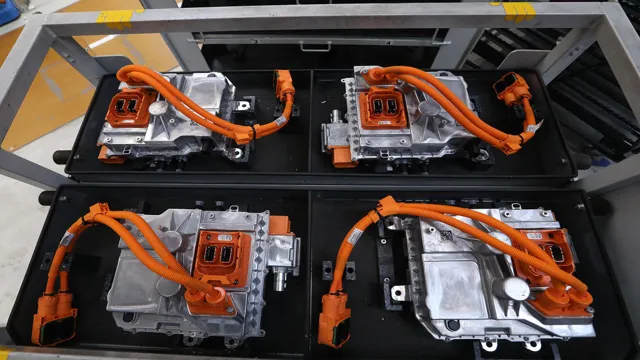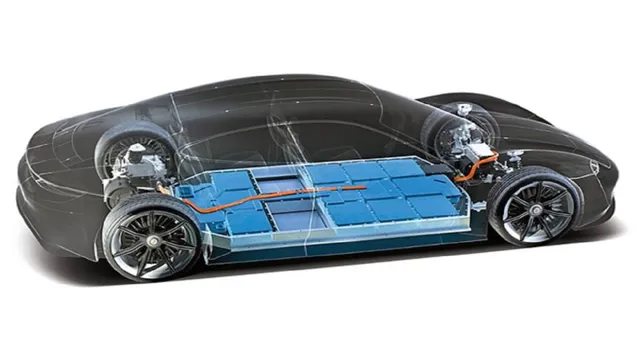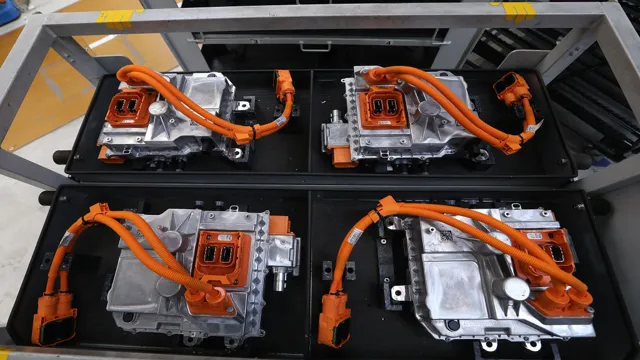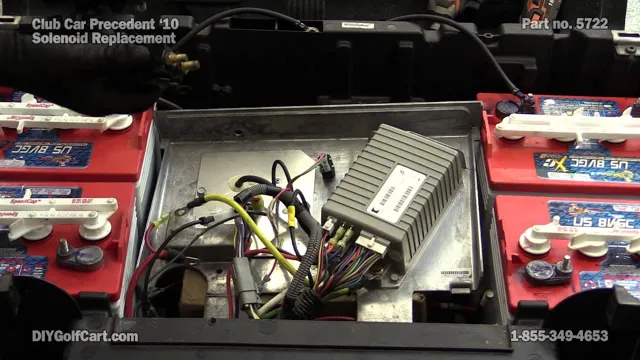Revive Your Electric Ride: The Ultimate Guide to Battery Replacement for Your Electric Car
With the rise in popularity of electric cars, more and more drivers are considering making the switch to an eco-friendly vehicle. One factor that may give some people pause, however, is the idea of having to replace the car’s battery. How exactly does one go about replacing an electric car battery, anyway? And how much does it cost? It’s natural to have questions and concerns when considering a major purchase like an electric car, but with some basic knowledge, you can make an informed decision.
In this complete guide to electric car battery replacement, we’ll cover everything you need to know, from the types of batteries available to the cost of replacement and more. Whether you’re a seasoned electric car owner or a newcomer to the world of EVs, read on to learn more about this important aspect of eco-friendly driving.
Why Replace Your Electric Car’s Battery?
When it comes to owning an electric car, we all want to make the most out of its battery life. However, like any other battery, its efficiency can only last for so long before it starts to lose its charging ability. This is when battery replacement for an electric car comes to play.
Before we talk about the benefits of getting a replacement, let’s discuss how you can tell if your battery needs to be changed. Signs of a failing battery include slower charging times, a shorter range, and reduced power. If you notice your electric vehicle is exhibiting any of these signs, then it’s time to consider a replacement.
Not only will a new battery restore the performance of your car, but it can also extend its life span and help you avoid higher repair costs down the line. So, if you want to keep your electric vehicle in tip-top shape, consider a battery replacement for an electric car today.
Improved Performance and Range
Replacing your electric car’s battery can offer significant benefits, including improved performance and range. As your car’s battery ages, it can lose its ability to hold a charge and provide the same level of power as when it was new. This can result in decreased acceleration and range, which can be frustrating for drivers, especially those who rely on their electric cars for daily commuting.
Upgrading your car’s battery can give it a new lease on life, allowing it to perform like it did when it was first purchased. Not only will you be able to go longer distances on a single charge, but you’ll also experience quicker acceleration and smoother driving. So, if you’re noticing that your electric car isn’t performing like it used to, it may be time to consider a battery replacement and enjoy the many benefits that come with it.

Reduced Maintenance Costs
When it comes to owning an electric car, one of the most significant benefits is its reduced maintenance costs. Unlike traditional gas-powered vehicles, electric cars have fewer moving parts and require less frequent maintenance. But over time, electric car batteries can degrade and lose their ability to hold a charge, which can result in reduced driving range and performance.
This is why it may be necessary to replace your electric car’s battery. While it may seem like a costly expense, a new battery can actually save you money in the long run by ensuring your car operates efficiently and with optimal performance. Plus, with advances in technology, new electric car batteries are becoming more affordable and accessible, making it a smart investment for electric car owners looking to maintain the long-term benefits of their vehicle.
Factors to Consider Before Battery Replacement
Before jumping into the decision of battery replacement for an electric car, there are several factors that need to be taken into consideration. The most important factor is the battery’s overall health and performance. If the battery is still performing well, then replacement may not be necessary, but if it is significantly degraded, then replacement may be the best option.
Another factor to consider is the cost of a new battery. Due to the still relatively new technology, the cost of a new battery can be significant. However, with the advancements in technology, the cost is slowly coming down.
Additionally, the age of the car must also be considered. For older electric cars, a battery replacement may not be worth the investment as the overall value of the car may not warrant it. Other considerations include the availability of replacement batteries and the environmental impact of disposing of the old battery.
Overall, it is essential to evaluate all the factors before making a final decision on battery replacement for an electric car.
Age of the Car and Battery
When it comes to replacing a car battery, many factors come into play. The age of the car and battery are two crucial factors to consider before replacing the battery. A good rule of thumb is to replace your car battery every three to five years, depending on usage and driving conditions.
Hot climates can be particularly hard on car batteries, and frequent short trips can also cause wear and tear. If your car is at least three years old and you are experiencing issues with starting, it may be time for a replacement. Another factor to consider is the type of battery that your car requires; different cars require different types of batteries.
Some batteries may last longer than others, but they typically come at a higher cost. Ultimately, it’s important to do your research and consult with a professional before making a battery replacement decision. Investing in a high-quality battery may save you money in the long run.
Battery Health and Condition
Battery replacement is inevitable as a car owner. But before jumping to conclusions that your battery needs a replacement, consider a few factors. The battery’s age is the most obvious one.
A lead-acid battery lives on average for around four to five years. Experienced drivers recommend checking battery health after three years. However, the condition is essential as well.
Even if the battery is young, it’s fatal if it’s entirely drained, overheated, or exposed to extreme temperatures. Thus, if the battery’s low on charge too frequently, it might need to be replaced. Furthermore, the charging system should be checked and tested too, because it may not be the battery that needs replacement, but a faulty alternator or a blown fuse.
Knowing these factors can help save money on unnecessary battery replacements.
Cost of Replacement
When it comes to replacing a battery, determining the cost can be a daunting task. However, several factors need to be considered before diving headfirst into the process. Firstly, the age of the battery plays a huge role in determining the cost of the replacement.
Newer batteries tend to cost much more than old ones, so it’s essential to take note of the age of your battery before deciding on a replacement. Secondly, the brand of the battery also matters. Popular brands charge a premium for their products, while lesser-known brands may offer better deals.
Another factor to consider is the type of battery you need. Different types of batteries come with varying price tags, so it’s crucial to know which type your device requires. Lastly, the complexity of the replacement also affects the cost.
If the replacement requires dismantling a significant part of the device, the cost may increase. Before replacing a battery, it’s essential to consider all these factors to determine the most cost-effective solution.
Types of Electric Car Batteries
Battery replacement for an electric car can be a daunting task, but understanding the types of batteries available can make the process easier. There are two main types of electric car batteries: lithium-ion and nickel-metal hydride. Lithium-ion batteries are the most common and are known for their durability, efficiency, and energy density.
They are also more expensive than nickel-metal hydride batteries but can last longer. Nickel-metal hydride batteries, on the other hand, are less costly but are heavier and less efficient. They are commonly used in hybrid electric cars but are slowly being replaced by lithium-ion models.
Choosing the right battery replacement for your electric car depends on your driving needs and budget. It’s essential to work with a qualified technician to determine the best options for your vehicle and ensure proper installation. Ultimately, investing in a high-quality battery replacement can save you money in the long run and extend the life of your electric car.
Lithium-ion Batteries
Lithium-ion batteries are currently the most popular type of electric car battery. These batteries are known for their high energy density, which means they can store a lot of energy in a relatively small and lightweight package. The most common type of lithium-ion battery used in electric cars is the nickel manganese cobalt oxide (NMC) battery, but there are also other types like lithium iron phosphate (LFP) and lithium titanate oxide (LTO).
Each of these batteries are designed with different characteristics in mind, with some favoring energy density while others prioritize safety and longevity. While there are pros and cons to each type, the overall goal is to create a battery that is reliable, relatively affordable, and offers enough range to make electric vehicles a viable alternative to gasoline cars. So, the next time you’re considering an electric car, make sure to do your research on the type of battery that comes with it!
Nickel-Metal Hydride (NiMH) Batteries
When it comes to electric cars, one of the most important components is the battery. There are a few different types of electric car batteries, each with its own advantages and disadvantages. One popular option is nickel-metal hydride (NiMH) batteries.
These batteries are known for their reliability and longevity, making them a top choice for many electric car manufacturers. NiMH batteries are also more environmentally friendly than some other options, as they don’t contain toxic materials like lead or cadmium. However, they do have some limitations, such as a lower energy density than other types of batteries.
Despite this, they remain a popular choice for many electric car enthusiasts. If you’re considering an electric car, it’s important to look into the different types of batteries available to find the one that best suits your needs.
How to Replace Your Electric Car’s Battery
Battery replacement for an electric car can be a daunting task, but it can save you a lot of money and increase your car’s lifespan. Before you start, make sure you have the correct replacement battery for your car model, and that it’s fully charged. Then, begin by disconnecting the negative cable from the old battery and removing it from the car.
Take the time to clean the battery tray and cables before installing the new one. Connect the positive cable first, then the negative one. Don’t forget to check the battery’s charge level and calibrate it if necessary.
Keep in mind that battery replacement can vary depending on the make and model of your car, so be sure to consult your owner’s manual or a professional mechanic if you’re unsure. With a little bit of skill and patience, you can replace your electric car battery and get back on the road in no time!
Choose the Right Replacement Battery
Replacing an electric car’s battery is a vital aspect of owning such an automobile. One of the most crucial considerations when replacing a battery is finding the right replacement. Choosing a battery that is compatible with your electric car’s make and model is vital.
It is also important to find a battery that has the same voltage and capacity as the original one. Replacing a battery may be expensive, but it’s essential to invest in a reliable and durable one to avoid incurring additional costs in the future. Opting for a high-quality battery ensures that it will last for a more extended period, saving you money, time, and the hassle of replacing it frequently.
Regular maintenance and battery checks are also crucial to ensure that it runs efficiently and effectively. By these means, you can drive optimally, knowing that your electric car’s battery is reliable and efficient.
Disconnect the Old Battery
If you plan to replace your electric car’s battery, it’s important to start by disconnecting the old one safely. First, switch off the car and remove the keys. Then, locate the battery and use the appropriate tools to loosen and disconnect the terminals (negative first, then positive).
Be careful not to damage any wires or components in the process. Once the battery is fully disconnected, remove it carefully from the car and dispose of it properly according to state and local regulations. Remember, properly disconnecting and disposing of your old battery is just as important as installing the new one properly to ensure a safe and successful replacement process.
Install the New Battery
So, you’ve decided it’s time to replace the battery in your electric car. Installing a new battery can be a daunting task, but with the right knowledge and tools, you can do it yourself. First, make sure you have the proper replacement battery, as not all batteries are created equal.
Next, locate the battery and disconnect the negative terminal before removing the old battery. Be sure to replace any bolts or brackets that came off during the removal process to secure the new battery in place. Once the new battery is in position, reattach the negative terminal and turn on the car to ensure the battery is functioning properly.
With a new battery installed, you can enjoy the full range of your electric vehicle once again. Remember, regular battery maintenance can extend the life of your battery, so be sure to check and maintain it regularly.
Maintenance Tips to Extend Battery Life
Replacing the battery of an electric car can be an expensive and time-consuming process. That’s why it’s important to implement maintenance tips that can help extend the battery life of your vehicle. One simple tip is to avoid exposing your electric car to extreme temperatures.
Excessive heat or cold can reduce the battery capacity and shorten its lifespan. Another tip is to limit the use of high-power accessories, such as air conditioning, which can drain the battery quickly. Additionally, keeping the battery charged between 20% to 80% can help prolong its life.
Avoid fully depleting the battery as it can damage the battery cells. Finally, it’s recommended to have your battery checked periodically by a professional technician, who can diagnose and address any potential issues before they become more serious. By following these maintenance tips, you can extend the life of your electric car’s battery and avoid an expensive replacement.
Proper Charging Practices
If you want to extend the lifespan of your battery, it’s essential to follow proper charging practices. First and foremost, avoid overcharging your device as this can cause permanent damage. It’s also a good idea to use the charger that’s specifically designed for your device to ensure that it’s receiving the right amount of power.
Many people also believe that letting your battery completely drain before charging it is necessary, but this can actually be harmful. Instead, try to keep your battery between 20-80% charged to prevent strain on the internal components. Lastly, make sure to avoid exposing your device to extreme temperatures, as this can also damage the battery.
If you follow these simple tips, you can help ensure that your battery lasts longer and performs at its best level for a longer period of time.
Avoid Extreme Temperatures
When it comes to extending the life of your battery, one important tip to keep in mind is to avoid exposing it to extreme temperatures. Both hot and freezing temperatures can have detrimental effects on your battery’s performance and lifespan. If you live in an area with harsh weather conditions, make sure to keep your device away from direct sunlight, heating systems, or air conditioning units.
If you plan on storing your device for an extended period, make sure to place it in a cool and dry place with moderate temperature. Sudden temperature changes can also cause damage to your battery, so avoid exposing your device to extreme temperature shifts whenever possible. By keeping your battery at a moderate temperature, you’ll be able to extend its lifespan and ensure optimal performance for your device.
Regular Inspection and Maintenance
As a car owner, one of the most important things you can do to extend the life of your battery is to regularly inspect and maintain it. This includes checking the battery’s terminals to make sure they’re clean and free of corrosion, tightening any loose connections, and testing the battery’s voltage to ensure it’s holding a charge. Additionally, it’s important to keep the battery clean and dry, as any moisture or dirt buildup can cause damage.
To keep your battery in top shape, it’s recommended that you have it professionally inspected and serviced at least once a year. By following these maintenance tips, you can help ensure your battery lasts as long as possible, minimizing the need for costly replacements and keeping your car running smoothly. So don’t neglect your battery – small steps now can lead to significant savings down the road.
Conclusion
In summary, replacing the battery of an electric car is crucial for ensuring its longevity and performance. It’s like giving your car a new lease on life and allowing it to continue to lead the charge (pun intended) in the world of sustainable transportation. Plus, with advancements in technology and the increasing availability of green energy sources, we can look forward to even better battery replacements in the future.
So go ahead and keep that electric car running smoothly – after all, what’s not to love about a vehicle that’s fuel efficient, has zero emissions, and makes you feel like you’re driving a spaceship!”
FAQs
How often should you replace the battery in an electric car?
The lifespan of an electric car battery can vary, but it typically lasts between 8-10 years or approximately 100,000 miles.
Can I replace the battery in my electric car myself, or do I need to take it to a professional?
It’s important to have a professional replace your electric car battery, as it can be dangerous and complicated to do on your own.
How much does it typically cost to replace an electric car battery?
The cost of replacing an electric car battery can vary depending on the make and model of the vehicle. On average, it can cost between $3,000-$5,000.
Is it possible to extend the life of my electric car battery?
Yes, there are several things you can do to extend the life of your electric car battery, such as avoiding extreme temperatures and not letting it fully discharge before charging it again.






